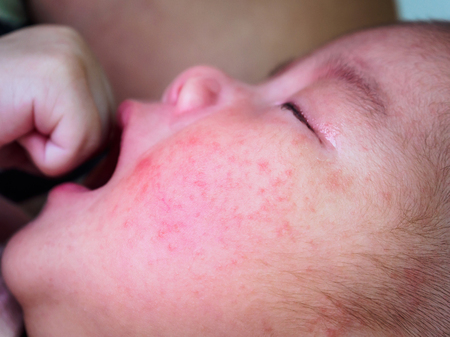Paediatrics
TNAP: Common Feeding Problems in Infants

Is your little one experiencing any common baby feeding problems? As all parents know, caring for an infant often feels like you are playing detective, trying to decode your baby’s likes and dislikes and causes for crying.
From reflux and colic to allergies and rash, here are some common feeding problems in infants to watch out for.
Colic
Does your healthy, well-fed infant go through unexplained, extreme periods of crying for three hours or more, in the evenings around the same time?
There’s a chance you have a colic baby. While the exact cause of colic is unknown, according to Dr Ian Ong from SBCC, ” The most widely held view is that colic is due to trapped wind causing pain in the infant’s tummy.”
Colic commonly starts at about 1 month of age and begins to subside by about 4 months of age. The important thing to “remember colic is a transient phenomenon.” Your infant will outgrow it.
Other than prolonged periods of crying, colic symptoms include forceful screaming and fussing while arching their backs, drawing up their legs, clenching their fists or tensing their abdominal muscles.
To help soothe a colic infant, you may try “anti-wind” medications such as Infacol, Rid-Wind drops or gripe water; baby massages; gently rocking the baby in a sling or taking them for a stroll in the pram to mimic the various movements that they felt when they were inside the womb.
“Usually, in the case of colic, the infant is otherwise healthy and well. The infant should be feeding well, passing normal stools and urine, and should not be running a temperature,” Dr Ong wrote.
If you notice a fever, vomiting or diarrhorea, a distended tummy that responds painfully to touch, changes in your baby’s eating and sleeping behaviour, or persistent irritability, please consult a doctor.
Spit-up, vomit, reflux, and diarrhorea
Don’t be alarmed if your infant spits up several times a day, such as after feeding or burping. At this age, their digestive systems are still developing. By the time babies reach 12 to 14 months, they should experience less to no spit-up and reflux.
A baby’s muscle at the bottom of their esophagus is still weak, which explains why they may have reflux easily. Reflux is when stomach contents such as milk come back up the esophagus.
To minimize reflux, keep your baby upright for 30 minutes after they eat to allow food to settle. Don’t fasten their diaper too tightly. Avoid overfeeding your baby, and remember to burp them during and after each feeding.
The difference between spitting up and vomiting is in the quantity and force of food expelled. If a bit of food is coming up without much effort (e.g. when the baby is burped), it is probably spit-up.
If your baby is vomiting forcefully in large quantities, check their temperature and look for other signs of illness: For instance, if they have diarrhorea concurrently, it may be a sign that they have a stomach bug and need to see a doctor.
Be sure to hydrate your infant as vomiting and diarrhorea cause loss of fluids and could lead to dangerous dehydration.
See also: Handling Baby’s Spit up: What To Do
Gas
Babies swallow air when they drink milk, which causes gas bubbles in their stomachs. The trapped air could cause discomfort.
While all babies are naturally gassy, sometimes they may have some gas that, well, refuses to pass.
If your little one is fussier and more irritable than normal, keeps squirming and pulling up their legs, or just appears downright uncomfortable, try the following techniques to see if “stuck gas” is the problem.
Burp your baby in different positions, such as placing them belly-down on your legs, and gently rubbing or patting their back. You could also burp them over your shoulder, or hold them in a forward-leaning sitting position with your hand supporting their chest and neck.
Ease their digestion by taking frequent burp breaks partway through a feed as well as after. Another technique is to “bicycle” your baby’s legs, which could help them pass gas. Hey, at least baby farts are cute – well, if it’s your baby’s, that is!
Constipation
When your baby hasn’t passed motion for days, you might be worried that they are constipated. Until you became a parent, you had probably never wished so desperately for another human to poop!
But fret not. According to Sarah Shamila, Nutrition and Dietetic Services manager at Mount Alvernia, “It is normal for a breastfed baby older than six weeks to only have one bowel movement every few days. Some healthy babies will only have one bowel movement a week.”
“When bowel movements are less frequent, they should be more profuse in volume. As long as the baby is gaining well, wetting sufficiently, and is happy and content there is no cause to be alarmed by infrequent bowel movements, and it is not necessary to give the baby a laxative or fruit juice,” Mrs Shamila wrote in an email.
When your baby has that poopy diaper, you can breathe a sigh of relief and rejoice – before you have to start cleaning it all up!
Do note that if your baby’s stool is hard or bloody and painful to pass, it could suggest that they are constipated. Call your pediatrician if you notice these symptoms.
Rash, eczema, and allergies

Spotting a red rash on a baby’s soft, tender skin is distressing for any parent (mosquito bites are bad enough), but before you consider it a food-related allergic reaction, consider other likely culprits – for instance, drool; overheating which could lead to a heat rash; environmental stimulus such as dust mites and grass; or pet allergies.
Some babies develop eczema, which looks like angry red patches of dry, scaly skin in areas such as the cheeks, neck, hands, and bends of the elbows and knees. Though itchy and uncomfortable, baby eczema often goes away by itself. In the meantime, try avoiding these common triggers:
- Heat, which exacerbates the itchiness of eczema
- Irritants such as synthetic fabric (E.g. polyester), tight clothes, and perfumed or antibacterial body and laundry soaps which may be too harsh on baby’s skin. Opt for 100% cotton clothes and the gentlest, most mild body soaps (or forgo them altogether and simply rinse your baby instead), and choose fragrance-free laundry detergents and moisturizers.
- Common allergens such as eggs, cow’s milk, peanuts, shellfish, and wheat and soy products. If you are breastfeeding your baby, withhold from consuming these foods before you nurse and see if it makes a difference in your baby’s eczema.
At what point should a parent get their child tested for food-related allergies?
“To make it easier to spot an allergy, give your baby only one new food at a time and wait a couple of days before trying another,” Mrs. Shamila advised.
“Keep an eye out for signs of an allergic reaction or intolerance, like a rash, hives, wheezing, difficulty breathing, vomiting, excessive gas, diarrhorea, or blood in her stools.”
If you notice any of these reactions, call your pediatrician or, if the reaction is severe, go to the A&E.
By Jenny Tai.
Source: https://thenewageparents.com/common-feeding-problems-in-infants/



